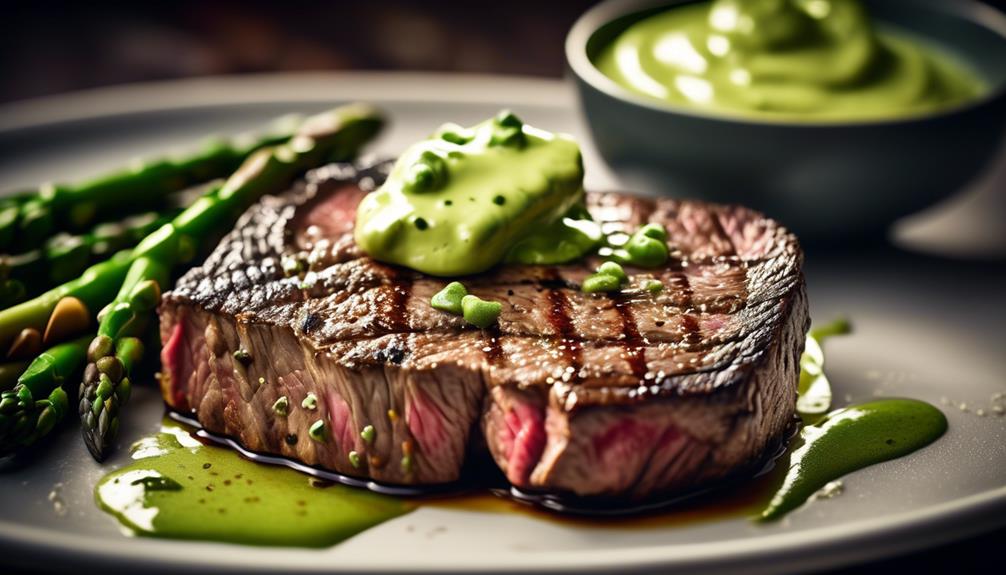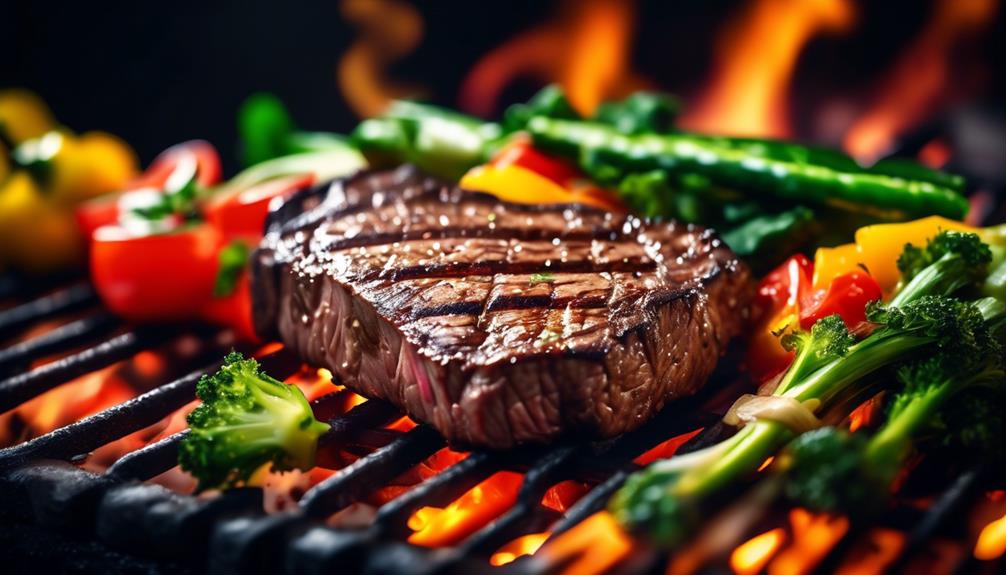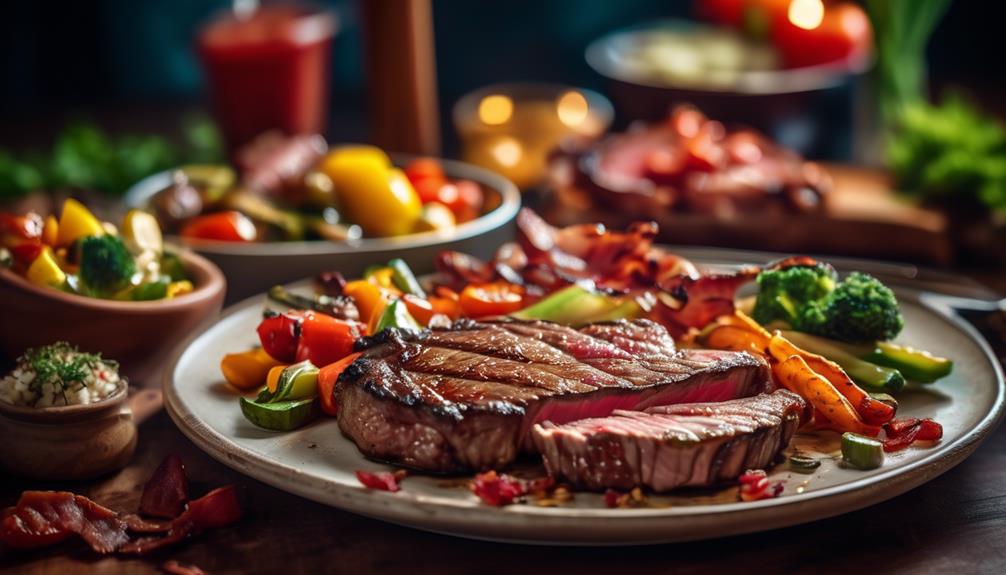Are you looking for a way to enhance your keto diet and achieve your health and fitness goals? Including meat in your meals might just be the answer you've been searching for.
Picture this: a juicy steak sizzling on the grill, emitting a mouthwatering aroma that instantly makes your taste buds tingle. But there's more to it than just satisfying your cravings.
By incorporating meat into your keto diet, you can benefit from its high protein content, essential nutrients, and the ability to support muscle growth. However, the advantages don't end there.
So, why should you consider adding meat to your keto diet? Let's explore further.
High in Protein

Including meat in your keto diet can provide you with a high amount of protein, which is essential for various bodily functions and can support your weight loss goals. When it comes to protein sources, meat is a top contender. It contains all essential amino acids, making it a complete protein source. Incorporating meat into your keto diet ensures that you're getting an adequate amount of protein to support muscle growth and repair, as well as other important functions in your body.
Protein is crucial for maintaining and building lean muscle mass. It helps to repair and rebuild tissues, supports the immune system, and aids in the production of enzymes and hormones. Including meat in your keto diet can help you meet your protein needs and support overall health.
In addition to being a high-quality protein source, meat offers other health benefits. It's rich in essential nutrients such as iron, zinc, and vitamin B12, which are important for energy production, immune function, and brain health. These nutrients are often lacking in plant-based protein sources, making meat an important addition to a keto diet.
Essential Nutrients
Meat provides a rich source of essential nutrients that are vital for maintaining optimal health and well-being. When following a keto diet, it's important to include meat in your meals as it offers a variety of essential nutrients that are difficult to obtain from other food sources.
Meat is particularly high in protein, which is necessary for building and repairing tissues, producing enzymes and hormones, and supporting overall growth and development. It also contains important vitamins and minerals such as vitamin B12, iron, zinc, and selenium.
Vitamin B12, found predominantly in animal products, plays a crucial role in maintaining a healthy nervous system and producing red blood cells. Iron is essential for transporting oxygen throughout the body and preventing anemia, while zinc supports immune function and helps with wound healing. Selenium acts as a powerful antioxidant and supports thyroid function.
Additionally, meat is a complete protein source, meaning it contains all nine essential amino acids that the body can't produce on its own. These amino acids are necessary for various physiological processes, including muscle growth and repair.
Boosts Metabolism

Incorporating meat into your keto diet can provide a boost to your metabolism. Here are three reasons why including meat in your diet can help increase your energy levels and improve digestion:
- High Protein Content: Meat is an excellent source of high-quality protein. Protein is known to have a higher thermic effect compared to carbohydrates and fats, meaning it requires more energy to digest. This can lead to an increase in your metabolic rate, helping you burn more calories throughout the day.
- Essential Amino Acids: Meat contains all the essential amino acids that your body needs to support various metabolic processes. These amino acids play a crucial role in maintaining and building lean muscle mass, which in turn can contribute to a higher metabolic rate. Increased muscle mass can help you burn more calories even at rest.
- Iron and Vitamin B12: Meat is a rich source of iron and vitamin B12, both of which are essential for proper energy production and metabolism. Iron is involved in the transportation of oxygen to your cells, while vitamin B12 helps convert food into energy. Having adequate levels of these nutrients can support optimal energy production and metabolism in your body.
Incorporating meat into your keto diet can provide you with increased energy levels and improved digestion. Its high protein content, essential amino acids, and nutrient profile make it a valuable addition to your meals.
Supports Muscle Growth
Consuming meat as part of your keto diet can play a crucial role in supporting muscle growth and development. Meat is an excellent source of high-quality protein, which is essential for muscle repair and growth. When you engage in intense physical activities, such as weightlifting or endurance training, your muscles undergo stress and micro-tears. Protein from meat provides the necessary building blocks for muscle recovery, helping to repair these tears and promote muscle growth.
In addition to aiding muscle recovery, meat consumption can also improve athletic performance. Meat is rich in important nutrients like iron, zinc, and B vitamins, which are involved in energy production and oxygen transport. Iron is particularly important for athletes as it helps deliver oxygen to the muscles, enhancing endurance and reducing fatigue. Zinc is essential for muscle protein synthesis, while B vitamins play a crucial role in converting food into energy.
Satiety and Weight Management

Including meat in your keto diet can have a positive impact on satiety and weight management.
Meat is high in protein, which has been shown to increase feelings of fullness and satiety, helping to reduce overall calorie intake.
Additionally, the high protein content in meat can enhance fat burning and promote weight loss.
Fullness and Satiety
Achieving fullness and satiety is crucial for effective weight management on a keto diet. When it comes to fullness and weight loss, meat can play a significant role. Here are three reasons why including meat in your keto diet can help you feel fuller and more satisfied:
- High protein content: Meat is a great source of protein, which is known to increase feelings of fullness. Protein takes longer to digest than carbohydrates and fats, keeping you satisfied for a longer period of time.
- Muscle mass preservation: When you lose weight, you want to focus on losing fat rather than muscle mass. Including meat in your diet provides essential amino acids that support muscle maintenance and growth.
- Nutrient density: Meat is packed with essential nutrients like iron, zinc, and B vitamins. These nutrients are important for overall health and can contribute to feelings of fullness and satiety.
Enhanced Fat Burning
To enhance fat burning and promote effective weight management on a keto diet, incorporating meat into your meals can be highly beneficial.
Meat is a rich source of protein and essential nutrients that can increase satiety, leading to reduced calorie intake and improved weight management.
Additionally, meat contains high-quality fats that can enhance fat burning and provide sustained energy throughout the day.
The increased energy derived from consuming meat can also improve athletic performance, allowing you to engage in more intense workouts and burn more calories.
Research has shown that diets rich in protein, such as those that include meat, can lead to greater fat loss and preservation of lean muscle mass.
Therefore, including meat as part of your keto diet can contribute to enhanced fat burning and support your weight management goals.
Improves Nutrient Absorption
Including meat in your keto diet can improve nutrient absorption and optimize nutrient utilization.
Meat is a rich source of essential vitamins and minerals, such as iron, zinc, and vitamin B12, which are crucial for various bodily functions.
Enhanced Nutrient Absorption
Improving nutrient absorption can be facilitated by incorporating meat into your keto diet. Here's how meat consumption can enhance nutrient absorption:
- Improved Digestion: Meat is a rich source of protein and essential amino acids that play a crucial role in digestion. The high protein content stimulates the release of digestive enzymes, promoting efficient breakdown and absorption of nutrients from other foods.
- Increased Nutrient Bioavailability: Meat contains heme iron, which is more easily absorbed by the body compared to non-heme iron found in plant-based foods. Consuming meat can help prevent iron deficiency anemia and improve overall nutrient bioavailability.
- Enhanced Micronutrient Intake: Meat is a valuable source of essential vitamins and minerals, including vitamin B12, zinc, and selenium. These micronutrients are necessary for various bodily functions and are better absorbed when consumed from animal sources.
Optimal Nutrient Utilization
Meat consumption on a keto diet has multiple benefits for nutrient absorption and utilization. One important factor is the bioavailability of nutrients. Meat, particularly red meat, is rich in heme iron, which is more easily absorbed by the body compared to non-heme iron found in plant-based sources.
In addition to iron, meat contains high-quality proteins that provide all essential amino acids needed for various bodily functions. These proteins are also more bioavailable than plant proteins.
Furthermore, including meat in a keto diet allows for greater dietary flexibility. It offers a wide range of essential nutrients, such as vitamins B12 and D, zinc, and omega-3 fatty acids. Obtaining sufficient quantities of these nutrients solely from plant-based sources can be challenging.
Versatility in Meal Planning

When planning meals on a keto diet, it's important to prioritize versatility to ensure a well-rounded and satisfying eating experience. Incorporating meat into your meal options can significantly enhance your dietary flexibility. Here are three reasons why meat can be a valuable addition to your keto meal planning:
- Protein Powerhouse: Meat is a rich source of high-quality protein, which is essential for building and repairing tissues, supporting immune function, and maintaining muscle mass. Including a variety of meats such as chicken, beef, and pork in your meals can help meet your protein needs while adding delicious flavors to your dishes.
- Satiety and Satisfaction: Meat is known for its ability to provide a sense of fullness and satisfaction. The high protein and fat content in meat can help keep you feeling satiated for longer periods, reducing the likelihood of overeating or snacking on unhealthy options.
- Diverse Cooking Methods: Meat offers a wide range of cooking methods, allowing for endless possibilities in meal preparation. Whether you prefer grilling, roasting, or sautéing, meat can be easily incorporated into various recipes, making it a versatile ingredient for your keto meal planning.
Conclusion
Including meat in your keto diet is crucial for a variety of reasons.
Not only is it high in protein, providing essential nutrients and supporting muscle growth, but it also boosts your metabolism and aids in weight management.
Additionally, meat improves nutrient absorption and offers versatility in meal planning.
So, just like a well-seasoned steak, adding meat to your keto diet adds that extra flavor and benefits that make it all the more satisfying and nourishing.







